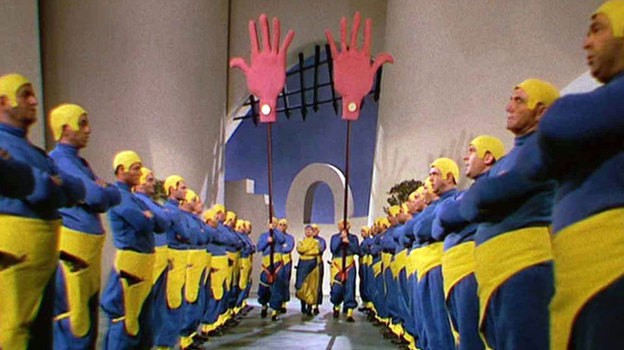
Documentary reveals that there’s still a whole lot to be done in Haitian recovery effort as organizations fight over details
FATAL ASSISTANCE (ASSISTANCE MORTELLE) (Raoul Peck, 2012)
Film Society of Lincoln Center, Elinor Bunin Munroe Film Center
144 West 65th St. between Broadway & Amsterdam Aves.
February 28 – March 6
212-875-5600
www.filmlinc.com
 Award-winning Haitian filmmaker Raoul Peck’s Fatal Assistance begins by posting remarkable numbers onscreen: In the wake of the devastating earthquake that hit his native country on January 12, 2010, there were 230,000 deaths, 300,000 wounded, and 1.5 million people homeless, with some 4,000 NGOs coming to Haiti to make use of a promised $11 billion in relief over a five-year period. But as Peck reveals, there is significant controversy over where the money is and how it’s being spent as the troubled Haitian people are still seeking proper health care and a place to live. “The line between intrusion, support, and aid is very fine,” says Jean-Max Bellerive, the Haitian prime minister at the time of the disaster, explaining that too many of the donors want to cherry-pick how their money is used. Bill Vastine, senior “debris” adviser for the Interim Commission for the Reconstruction of Haiti (CIRH), which was co-chaired by Bellerive and President Bill Clinton, responds, “The international community said they were gonna grant so many billions of dollars to Haiti. That didn’t mean we were gonna send so many billions of dollars to a bank account and let the Haitian government do with it as they will.” Somewhere in the middle is CIRH senior housing adviser Priscilla Phelps, who seems to be the only person who recognizes why the relief effort has turned into a disaster all its own; by the end of the film, she is struggling to hold back tears.
Award-winning Haitian filmmaker Raoul Peck’s Fatal Assistance begins by posting remarkable numbers onscreen: In the wake of the devastating earthquake that hit his native country on January 12, 2010, there were 230,000 deaths, 300,000 wounded, and 1.5 million people homeless, with some 4,000 NGOs coming to Haiti to make use of a promised $11 billion in relief over a five-year period. But as Peck reveals, there is significant controversy over where the money is and how it’s being spent as the troubled Haitian people are still seeking proper health care and a place to live. “The line between intrusion, support, and aid is very fine,” says Jean-Max Bellerive, the Haitian prime minister at the time of the disaster, explaining that too many of the donors want to cherry-pick how their money is used. Bill Vastine, senior “debris” adviser for the Interim Commission for the Reconstruction of Haiti (CIRH), which was co-chaired by Bellerive and President Bill Clinton, responds, “The international community said they were gonna grant so many billions of dollars to Haiti. That didn’t mean we were gonna send so many billions of dollars to a bank account and let the Haitian government do with it as they will.” Somewhere in the middle is CIRH senior housing adviser Priscilla Phelps, who seems to be the only person who recognizes why the relief effort has turned into a disaster all its own; by the end of the film, she is struggling to hold back tears.
A self-described “political radical,” Peck doesn’t play it neutral in Fatal Assistance, instead adding mournful music by Alexei Aigui, somber English narration by a male voice (Peck narrates the French-language version), and a female voice-over reading melodramatic “Dear friend” letters that poetically trash what is happening in Haiti. “Every few decades, the rich promise everything to the poor,” the male voice-over says. “The dream of eradication of poverty, disease, death remains a perpetual fantasy.” Even though Peck (Lumumba, 2010 Human Rights Watch Film Festival centerpiece Moloch Tropical) attacks the agendas of the donors and NGOs while pushing an agenda of his own, Fatal Assistance is an important document that shows that just because money pours in to help in a crisis situation doesn’t mean that the things that need to be done are being taken care of properly. The centerpiece selection of the 2013 Human Rights Watch Film Festival, Fatal Assistance is back at the Film Society of Lincoln Center for its week-long U.S. theatrical release February 28 – March 6 with Peck, the former Haitian minister of culture, the 1994 winner of the HRWFF’s Nestor Almendros Award for courage in filmmaking, and the 2001 HRWFF Lifetime Achievement Award winner, on hand for Q&As after several screenings.




 Israeli film critic Aharon Keshales and his former student Navot Papushado follow up their 2011 Israeli slasher flick, Rabies, with the gory, ultraviolent black-comedy thriller Big Bad Wolves. Award-winning actor Lior Ashkenazi stars as Miki, a cop who is sure that Bible teacher Dror (Rotem Keinan) is behind the grisly kidnap, rape, and murder of a young girl. Miki and his partner, Rami (Menashe Noy), and two thugs try to beat the truth out of Dror, against the direct orders of their commanding officer, Zvika (Dvir Benedek). When the illegal interrogation winds up on YouTube, Miki is relieved of duty — with Zvika’s blessing to continue to go after Dror. But when Gidi (Tzahi Grad), the father of the dead girl, joins the chase, things threaten to get out of control — and quickly become even crazier. Big Bad Wolves is a sly, smart take on such genre pictures as Oldboy, Se7en, and Quentin Tarantino’s Reservoir Dogs, Pulp Fiction, and Inglourious Basterds, featuring generous amounts of brutal torture along with some very funny bits involving Jewish mothers. Writer-directors Keshales and Papushado keep the audience guessing right up to the very end as the main characters rarely do what is expected and hysterical comic scenes show up at rather inopportune moments. While playing with the standard elements of the revenge flick and the cop-on-the-edge tale, the dark, atmospheric Big Bad Wolves also explores the unbreakable bond between parents and children, lending more than a touch of gravitas to the wild, unpredictable proceedings, which are not for the faint of heart.
Israeli film critic Aharon Keshales and his former student Navot Papushado follow up their 2011 Israeli slasher flick, Rabies, with the gory, ultraviolent black-comedy thriller Big Bad Wolves. Award-winning actor Lior Ashkenazi stars as Miki, a cop who is sure that Bible teacher Dror (Rotem Keinan) is behind the grisly kidnap, rape, and murder of a young girl. Miki and his partner, Rami (Menashe Noy), and two thugs try to beat the truth out of Dror, against the direct orders of their commanding officer, Zvika (Dvir Benedek). When the illegal interrogation winds up on YouTube, Miki is relieved of duty — with Zvika’s blessing to continue to go after Dror. But when Gidi (Tzahi Grad), the father of the dead girl, joins the chase, things threaten to get out of control — and quickly become even crazier. Big Bad Wolves is a sly, smart take on such genre pictures as Oldboy, Se7en, and Quentin Tarantino’s Reservoir Dogs, Pulp Fiction, and Inglourious Basterds, featuring generous amounts of brutal torture along with some very funny bits involving Jewish mothers. Writer-directors Keshales and Papushado keep the audience guessing right up to the very end as the main characters rarely do what is expected and hysterical comic scenes show up at rather inopportune moments. While playing with the standard elements of the revenge flick and the cop-on-the-edge tale, the dark, atmospheric Big Bad Wolves also explores the unbreakable bond between parents and children, lending more than a touch of gravitas to the wild, unpredictable proceedings, which are not for the faint of heart.


